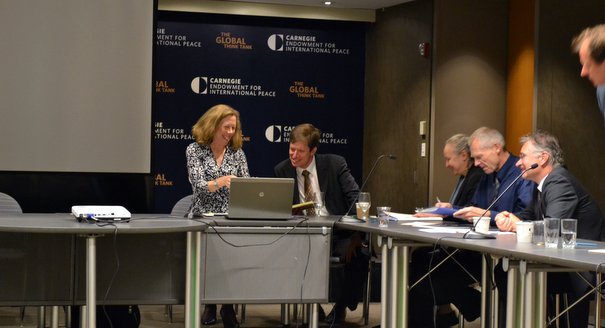Registration
You will receive an email confirming your registration.
The year 2015 is likely to be remembered as a milestone on the long journey toward addressing the risks posed by global climate change. In addition to the anticipation surrounding the upcoming UN climate talks in Paris, there was also a historic announcement by the G7 that the global economy must fully decarbonize by the end of this century.
The Carnegie Endowment’s David Livingston, with the support of the German Embassy’s Transatlantic Climate Bridge, convened a half-day workshop with leading energy and climate thinkers from both the United States and Germany to discuss this bold announcement. Participants from both the public and private sectors examined the current state of emissions reduction trajectories, and discussed what further action and collaboration will be necessary in the years ahead, with an eye to the particular social, political, and economic challenges found in each country. A number of insights arose from the discussion, including the need to focus on long-lived infrastructure and policy decisions rather than year-to-year changes in energy or emissions balances, as well as the necessity to directing financial flows to decarbonization-friendly investments over the two major physical capital cycles that will occur before the end of this century.
The event was held under the Chatham House Rule and divided into two sessions moderated by David Livingston, with opening remarks given by the following featured speakers. Read more about the G7 climate mandate and the tragedy of horizons.
Agenda
Session 1: The Challenge of Decarbonization: Current Trajectories and Gaps
- Mark Thurber, Associate Director of the Program on Energy and Sustainable Development (PESD) at Stanford University
- Almut Kirchner, Head Principal of Energy and Climate Policy with Prognos AG
Session 2: Closing the Gap: Policies, Technologies, and Sector Strategies
- Christian Hey, Secretary General for the German Advisory Council on the Environment (SRU)
- Deborah Gordon, Director of the Energy and Climate Program at the Carnegie Endowment for International Peace
- Jon Creyts, Managing Director at the Rocky Mountain Institute (RMI)
- Manfred Fischedick, Vice President and Director of the Wuppertal Institute for Climate
Conclusion: Achieving Long-Term Transatlantic Leadership
- Michael Weber, Policy Advisor for Energy and Climate at the Embassy of the Federal Republic of Germany in Washington, DC
Participants
Jon Creyts
Jon Creyts is a managing director at Rocky Mountain Institute (RMI) where he leads research and collaboration activities across all of RMI’s major practice areas including: transportation, electricity, industry, buildings, sustainable communities, and finance.
Manfred Fischedick
Manfred Fischedick is vice president and director of the Wuppertal Institute for Climate, Environment and Energy. His research focuses on future energy and mobility structures, primarily searching for social innovations that will facilitate a transition into sustainable structures.
Deborah Gordon
Deborah Gordon is director of Carnegie’s Energy and Climate Program, where her research focuses on oil and climate change issues in North America and globally.
Christian Hey
Christian Hey is the secretary general for the German Advisory Counsel of the Environment (SRU). He also currently serves as board member for the Institute for European Environmental Policy, and is the former policy director of the European Environmental Bureau..
Almut Kirchner
Almut Kirchner is the head principal of Energy and Climate Policy with Prognos AG. Her work has concentrated on long-term model scenarios, paying particularly close attention to security, economy, and the environmental impact of energy production and consumption.
David Livingston
David Livingston is an associate in Carnegie’s Energy and Climate Program, where his research focuses on innovation, markets, and risk.
Mark C. Thurber
Mark C. Thurber is an associate director of the Program on Energy and Sustainable Development (PESD) at Stanford University. His research has focused on the role of state-owned enterprises working within global energy markets where he has contributed to a major volume on national oil companies, Oil and Governance: State-owned Enterprises and the World Energy Supply.
Michael Weber
Michael Weber is a policy adviser for Energy and Climate at the Embassy of the Federal Republic of Germany in Washington, DC. Michael also co-manages the Transatlantic Climate Bridge, a project platform by the German Foreign Office and the German Environment Ministry to enhance transatlantic cooperation on climate and energy issues.
